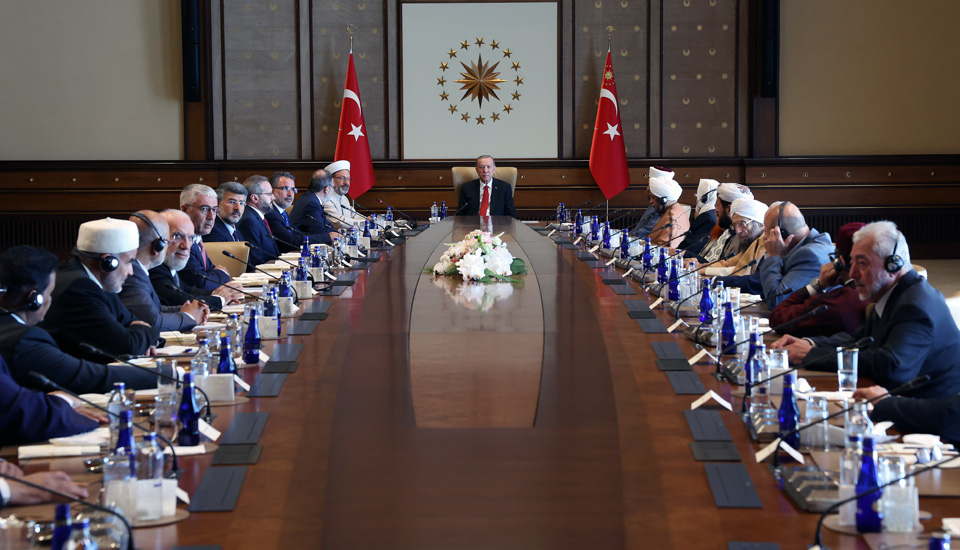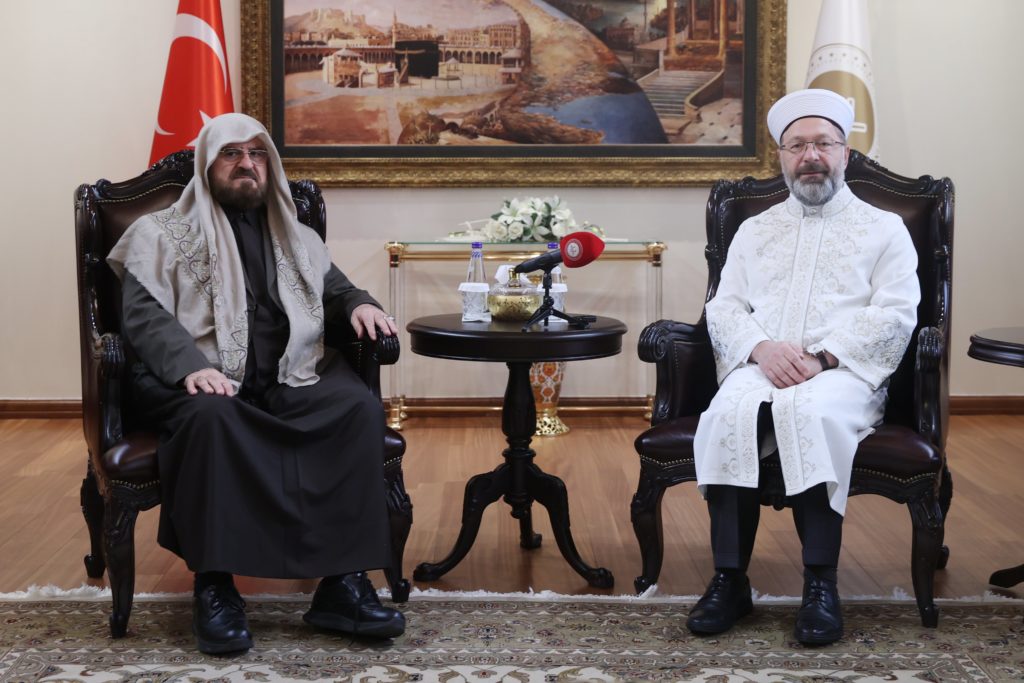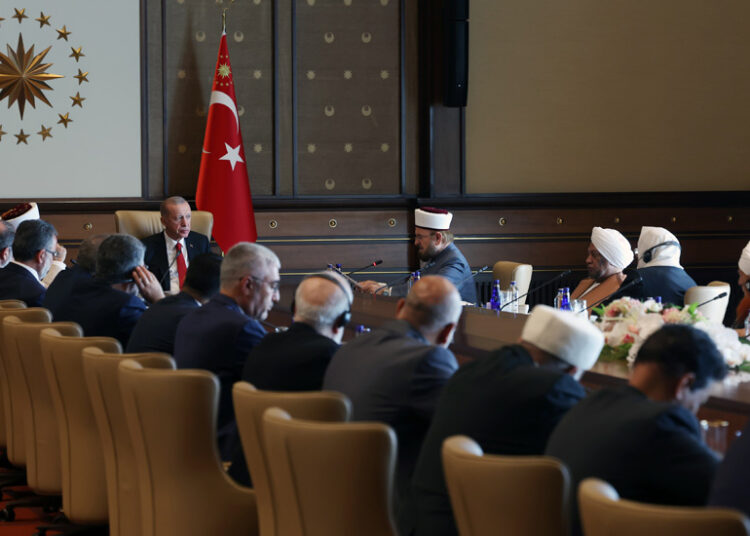Levent Kenez/Stockholm
Turkish President Recep Tayyip Erdogan remains committed to maintaining his affiliation with the Muslim Brotherhood as the anticipation of financial support from the United Arab Emirates (UAE) and Saudi Arabia grows amid Turkey’s struggling economy.
President Erdogan on Tuesday received a delegation the International Union of Muslim Scholars (IUMS), a Muslim Brotherhood-affiliated organization, at the presidential palace in Ankara. The meeting was attended by Ali Muhyiddin al-al-Qaradaghi, the secretary-general of the IUMS, as well as Ali Erbaş, the president of the Directorate of Religious Affairs (Diyanet), and Prof. Dr. Mehmet Görmez, the chair of the Institute of Islamic Thought and former head of the Diyanet. No information apart from photos of the meeting was shared by the President’s Office.
The IUMS, designated as a terrorist organization by Egypt, Saudi Arabia, the UAE and Bahrain in 2018, enjoys political protection, diplomatic support and financial aid from Turkey as well as Qatar.
With the exception of Qatar, the Gulf countries perceive the Muslim Brotherhood, which represents a militant and politicized Islamist ideology, as a potential challenge that could undermine the stability and continuity of their monarchies. As a result, these countries often view the activities and presence of the Brotherhood within their borders with a sense of caution and take strong measures against it.
Last month, President Erdogan made a visit to Saudi Arabia, Qatar and the UAE along with a delegation of 200 businesspeople. The visit marked a continuation of efforts aimed at normalization with Saudi Arabia and the UAE, with which Turkey has faced significant issues in recent years. During the trip Erdogan had discussions with Saudi Crown Prince Mohammed bin Salman, Qatari Emir Sheikh Tamim bin Hamad Al Thani and UAE leader Sheikh Mohammed bin Zayed Al Nahyan. The focal point of Erdogan’s intensive agenda was the anticipated foreign direct investment and joint-venture projects Turkey expects from the Gulf countries.
A report by Bloomberg had previously indicated that Turkey would receive $25 billion in funds through company sales and privatization from Gulf nations. Reuters, on the other hand, highlighted an expectation of $10 billion in the short term and a total of $30 billion in direct investment in the long run. Reports in the Turkish media went beyond these figures, suggesting an investment in Turkey that would significantly exceed $50 billion.
Turkey is also working to rebuild its relationship with Egypt. As part of a process of normalization that began in 2021, the two countries announced on July 4 that diplomatic relations would be restored to the ambassadorial level after a 10-year hiatus, resulting in the reciprocal appointment of envoys. Egyptian President Abdel Fattah el-Sisi was scheduled to visit Ankara, but due to the trip overlapping with the Russia-Africa Summit in July, his visit was postponed to a later date.
Erdogan had been an outspoken critic of el-Sisi since the latter seized power. The ousted Mohamed Morsi was the leader of the Muslim Brotherhood, which traditionally had strong ties with Islamists in Turkey. Turkey was the only country to demand that the UN Security Council impose economic and political sanctions on el-Sisi, claiming that he was a war criminal. The countries had declared each other’s ambassadors personae non gratae and expelled them in 2013.
İstanbul became the capital of Arab media critical of their governments back home, especially for Egyptian media linked to Morsi’s Muslim Brotherhood.
However, during the normalization process, Turkey had requested that Brotherhood media halt their coverage critical of the Gulf countries and Egypt. If that failed to take place, Turkey conveyed the message that deportation procedures could be initiated and the broadcasting activities of television stations could be obstructed. However, Egypt is still demanding the extradition of Muslim Brotherhood dissidents, the termination of Turkey’s military presence in Libya and the resolution of the problems between Turkey and Greece in the eastern Mediterranean.

Erdogan’s reception of the IUMS delegation immediately after his Gulf visit could be interpreted as an effort to maintain ties with this group, even as Turkey’s relations with countries that have banned the Muslim Brotherhood continue to develop, as well as a message that the Muslim Brotherhood still holds significance for him.
Erdogan staff often portray him as the leader of the entire Muslim world who challenges the West and other major powers in the name of Islam. The IUMS’s support for Erdogan adds credibility to these claims in the view of Turkish Islamists.
They have worked tirelessly to keep him in power, fearing the loss of privileges granted by the Erdogan government over the past two decades. The former head of the IUMS and Muslim Brotherhood spiritual leader, the late Yusuf al-Qaradawi, still widely revered in the Muslim world, referred to Erdogan as the leader of the Muslim Ummah during a meeting in 2018. He urged everyone to back him and pray for him. He endorsed Erdogan’s ambitions to take on the mantle of leadership in the Islamic world. Al-Qaradawi and his associates in the government were seen as agents of change who would stand up for Muslims globally and halt attacks against them. He strongly criticized Saudi Arabia, condemning its leadership for targeting the Muslim Brotherhood, including himself, and maintained that the country’s actions were not aligned with the principles of Islam.

Erdogan sent Erbaş, the top government imam, to al-Qaradawi’s funeral in Doha in October 2022, ensuring that Turkey was represented by a state official. Erbaş called al-Qaradawi one of the most respected scholars of the Islamic world.
The IUMS also works closely with the Diyanet, which controls some 80,000 mosques in Turkey and abroad with around 140,000 personnel, all on the government payroll.












